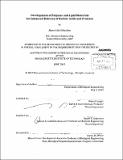Development of polymer and lipid materials for enhanced delivery of nucleic acids and proteins
Author(s)
Eltoukhy, Ahmed Atef
DownloadFull printable version (22.98Mb)
Other Contributors
Massachusetts Institute of Technology. Department of Biological Engineering.
Advisor
Robert Langer and Daniel G. Anderson.
Terms of use
Metadata
Show full item recordAbstract
The development of synthetic vectors enabling efficient intracellular delivery of macromolecular therapeutics such as nucleic acids and proteins could potentially catalyze the clinical translation of many gene and protein-based therapies. However, progress has been hindered by a lack of safe and effective materials and by insufficient insight into the relationship between key delivery properties and efficacy. Accordingly, working with a promising class of cationic, degradable gene delivery vectors, poly(-amino ester)s (PBAEs), we develop novel, hydrophobic PBAE terpolymers that display dramatically increased gene delivery potency and nanoparticle stability. We then develop a technique based on size-exclusion chromatography that enables the isolation of well-defined, monodisperse PBAE polymer fractions with greater transfection activities than the starting polymer. This technique also allows us to elucidate the dependence of gene delivery properties on polymer molecular weight (MW). Subsequently, we examine the cellular uptake and trafficking mechanisms of PBAE/DNA polyplexes, and demonstrate that polyplex internalization and transfection depend on a key endo/lysosomal cholesterol transport protein, Niemann-Pick C1 (Npcl). Finally, working with cationic lipids termed lipidoids, which have shown exceptional potency for the delivery of RNAi therapeutics, we develop these materials for intracellular delivery of proteins using a simple and novel approach in which nucleic acids serve as a handle for protein encapsulation and delivery. Preliminary in vivo experiments suggest the potential application of this approach toward lipidoid-mediated delivery of protein-based vaccines. Taken together, the work presented here advances the development of polymer and lipid materials for the safe and effective intracellular delivery of DNA and protein therapeutics.
Description
Thesis (Ph. D.)--Massachusetts Institute of Technology, Dept. of Biological Engineering, 2013. Cataloged from PDF version of thesis. Includes bibliographical references.
Date issued
2013Department
Massachusetts Institute of Technology. Department of Biological EngineeringPublisher
Massachusetts Institute of Technology
Keywords
Biological Engineering.